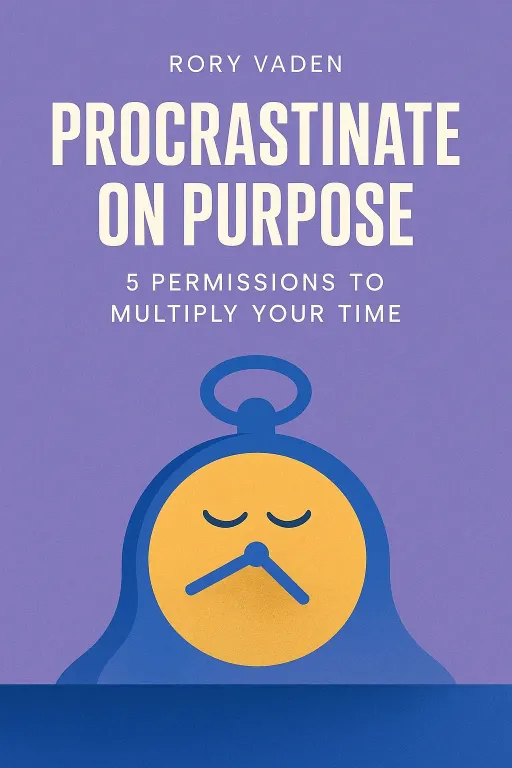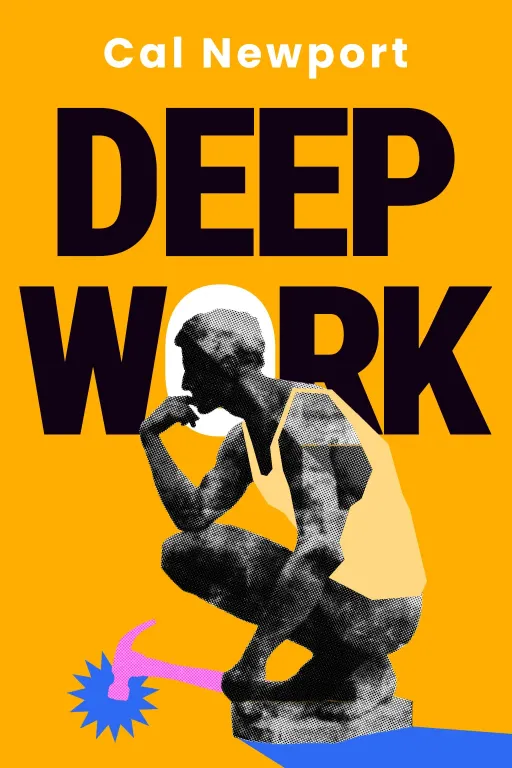
Procrastinate on Purpose
10 min5 Permissions to Multiply Your Time
Introduction
Narrator: Imagine a successful business partner, Dustin, about to leave for a day-long meeting. As he heads for the door, his two-year-old daughter, Haven, runs to him, wraps her arms around his leg, and pleads, "No, Daddy! No work! Please stay with me!" In that moment, the logical need to attend the meeting clashes with the powerful emotional pull of his daughter's request. This is a conflict that time management spreadsheets and to-do lists can't solve. It reveals a deeper truth: our most critical decisions about time are not just logical; they are profoundly emotional.
This is the central dilemma explored in Rory Vaden's book, Procrastinate on Purpose: 5 Permissions to Multiply Your Time. Vaden argues that the old rules of productivity—doing things faster or simply prioritizing better—are broken. In a world of constant demands, we don't need to manage time; we need to multiply it.
The Failure of Traditional Time Management
Key Insight 1
Narrator: For decades, time management has been taught through two primary lenses: efficiency and prioritization. The classic metaphor is a professor filling a large glass jar. First, he puts in big rocks (priorities), then pebbles, then sand, and finally water, showing that with creativity, you can always fit more in. This represents efficiency—doing more in the same amount of time. The second approach, prioritization, is about putting the big rocks in first.
However, Vaden argues this model is dangerously outdated. In today's world, the problem isn't that the jar is full; it's that we have an infinite supply of rocks, pebbles, and sand. The jar is constantly overflowing. This leads to what Vaden calls "Priority Dilution," a modern affliction where even top performers find themselves distracted by urgent but unimportant tasks, feeling busy but not productive. They fall victim to the "Tyranny of the Urgent," where the day is spent putting out fires instead of building for the future. This constant juggling act doesn't lead to success; it leads to stress, anxiety, and burnout. Prioritizing doesn't create more time; it just borrows it from one area of life to give to another, often at great personal cost.
The Significance Calculation: A Third Dimension of Thinking
Key Insight 2
Narrator: To escape the overflowing jar, Vaden introduces a third dimension to decision-making beyond Urgency and Importance: Significance. The Significance question is: "How long will this matter?" This simple question shifts the focus from short-term gains to long-term impact. It’s the key to multiplying time, which Vaden defines as spending time on things today that create more time tomorrow.
He illustrates this with the story of a top-tier financial advisor. Most advisors prioritize clients based on their current wealth. But this advisor posed a question to his peers: "What happens to all that money when your rich client dies?" It goes to their children, who often have no relationship with the advisor. He argued that spending time building relationships with the broke, 20-something heirs of wealthy clients—a low-urgency, low-importance task by traditional metrics—was actually a high-Significance activity. It was an investment that would pay massive dividends decades later. This is the multiplier mindset: making decisions today that give you back more time in the future.
The Permission to Eliminate: Saying No to Good to Say Yes to Great
Key Insight 3
Narrator: The first practical step to multiplying time is to eliminate. This is not about laziness but about ruthless focus. As the sculptor of his own schedule, the multiplier understands that perfection is achieved not when there is nothing more to add, but when there is nothing left to take away.
Ron Lamb, president of the billion-dollar software company Reynolds and Reynolds, provides a powerful case study. He noticed his teams were bogged down in meetings, stealing time away from customers. He implemented a simple mantra: "Need to Know, Need to Be." Only people who absolutely needed to be there to make a decision were invited to a meeting. Everyone else who just needed to know the outcome received a concise written summary afterward. This simple act of elimination turned many weekly meetings into monthly ones, saving 36 hours of productivity per person per year. Eliminating tasks requires giving yourself permission to ignore, to say "no" with class, and to understand that every "yes" is an implicit "no" to something else.
The Permission to Automate: Investing in Systems
Key Insight 4
Narrator: Automation is to your time what compounding interest is to your money. It is an investment that provides a continuous return. Vaden shares the story of his own company, Southwestern Consulting. In the early days, they operated on spreadsheets and manual processes, leading to chaos, miscommunication, and lost clients. They felt they didn't have the time or money to invest in a proper system.
Finally, they took the leap and invested in a comprehensive CRM and marketing automation platform. The process of setting it up was time-consuming, but the result was transformative. By automating follow-ups, internal communications, and lead generation, they created systems that worked for them 24/7. In the first year, their revenue doubled and their bottom line quadrupled. Vaden learned a critical lesson: a company can never outgrow the strength of its systems. The excuse of "not having time" to automate is precisely the reason it must be done.
The Permission of Imperfect: The Power of Delegation
Key Insight 5
Narrator: Many leaders and high-achievers are trapped by perfectionism, believing that "if you want it done right, you have to do it yourself." This mindset makes delegation impossible. Vaden argues for giving yourself the "Permission of Imperfect." He introduces the "30x Rule," a simple calculation for delegation. If a task takes you five minutes a day, you should be willing to spend up to 150 minutes (30 times 5) training someone else to do it. This initial time investment will pay for itself many times over.
This requires embracing the idea that 80% done by someone else is better than 100% done by you, because it frees you to focus on higher-value tasks. Serial entrepreneur Troy Peple lives by this, stating his job as a leader is to ensure things get done, not to do them himself. This mindset shift from doer to delegator is essential for anyone who wants to multiply their impact.
The Permission of Incomplete: Procrastinating on Purpose
Key Insight 6
Narrator: The book's most provocative idea is that procrastination can be a strategic tool. Vaden distinguishes between procrastination born of indulgence and patience born of intention. "Procrastinate on Purpose" is a synonym for patience. It means consciously waiting until the "last responsible moment" to act.
This strategy protects you from "unexpected change cost." If you complete a project weeks in advance, you risk having to redo it when a client changes their mind or new information emerges. By waiting, you gather more data and maintain flexibility. It also allows you to differentiate between true emergencies and mere urgencies. An emergency has significant, long-term consequences if ignored. An urgency is often just someone else's poor planning. Multipliers learn to let urgencies wait, giving themselves the "Permission of Incomplete" and trusting that what doesn't need to be done today can wait until tomorrow. This is not about being late; it's about being precisely on time.
Conclusion
Narrator: Ultimately, Procrastinate on Purpose reveals that the quest for productivity is not about managing a clock, but about managing our emotions and decisions. The single most important takeaway is that we must shift from a one-dimensional view of urgency to a three-dimensional view that includes Significance. We multiply our time not by doing more, but by investing our time in activities that will create more time and better results tomorrow.
The challenge Vaden leaves is to stop asking, "What's the most important thing I can do today?" and start asking, "What can I do today that will make tomorrow better?" By giving ourselves the five permissions—to Eliminate, Automate, Delegate, Procrastinate, and Concentrate—we can finally escape the tyranny of the urgent and begin building a life of true significance.









